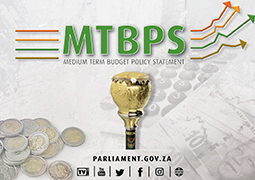
The Minister of Finance, Mr Enoch Godongwana, and his team appeared before a joint meeting of Parliament’s standing and select committees of Finance and Appropriations to discuss the Medium-Term Budget Policy Statement (MTBPS) the Minister had delivered in Parliament the previous day.
Explaining the rational of the MTBPS to the committees, the Minister remarked that one of the things that this year’s MTBP sought to achieve was to manage trade-offs in a climate of high inflation and slow economic growth triggered by global and domestic dynamics.
One such trade-off are the ongoing bail-outs necessary to keep state-owned entities (SOEs) afloat, as this undermines the provision front-line services. Another trade-off concerns National Treasury’s hopes for economic development, which hinge on government’s investment in infrastructure. This has to be balanced against the cost of the inflation and economic distress caused by Covid-19, which has compelled government to extent the Social Relief of Distress (SRD) grant.
The Minister elaborated further by saying, “We are often asked to cut the fuel levy and add more zero-valued-added tax items on the consumers’ baskets. As ideal as these suggestions may be, the Minister cautioned against hurting government revenue, which is also needed for social grants, social wages [grants] and infrastructure investment.
A member of the Standing Committee on Appropriations, Ms Dipuo Peters, asked why the Treasury is hesitant to formulate a policy position on the financial viability of extending the SRD grant to become a basic income grant. Minister Godongwana replied that no policy position has been taken in this regard, as the SRD is a stand-alone grant responding to Covid-19, while a basic income grant is a commitment in perpetuity.
He was also pressed by the Chairperson of the Standing Committee on Appropriations, Mr Sfiso Buthelezi, on the conditions required by National Treasury for SOEs to receive bailouts. Mr Buthelezi went on to say, “There is seemingly a view that problems at SOEs are money problems and if we throw money at them they will suddenly disappear. That has proven not to be the case over years.”
The Chairperson believes that SOEs’ primary problem is one of governance because many fail to manage the basics, such as presenting an annual financial report before Parliament for scrutiny. This is a breach of their responsibilities in terms of the Public Finance Management Act.
The Head of Asset and Liability at National Treasury, Mr Duncan Pieterse, stated that some of the required conditions for bail-out include the need to dispose of non-core assets, manage costs, allow independent assessors to investigate operations and to present a business case to ensure that their balance sheets are fit for purpose. “If they don’t meet these pre-conditions they won’t receive bail outs.”
Minister Godongwana pointed out that as SOEs report to various government departments and not to National Treasury, it is difficult for Treasury to keep tabs on this. He urged Parliament to call on these departments to hold their reporting SOEs to account.
Abel Mputing
28 October 2022

